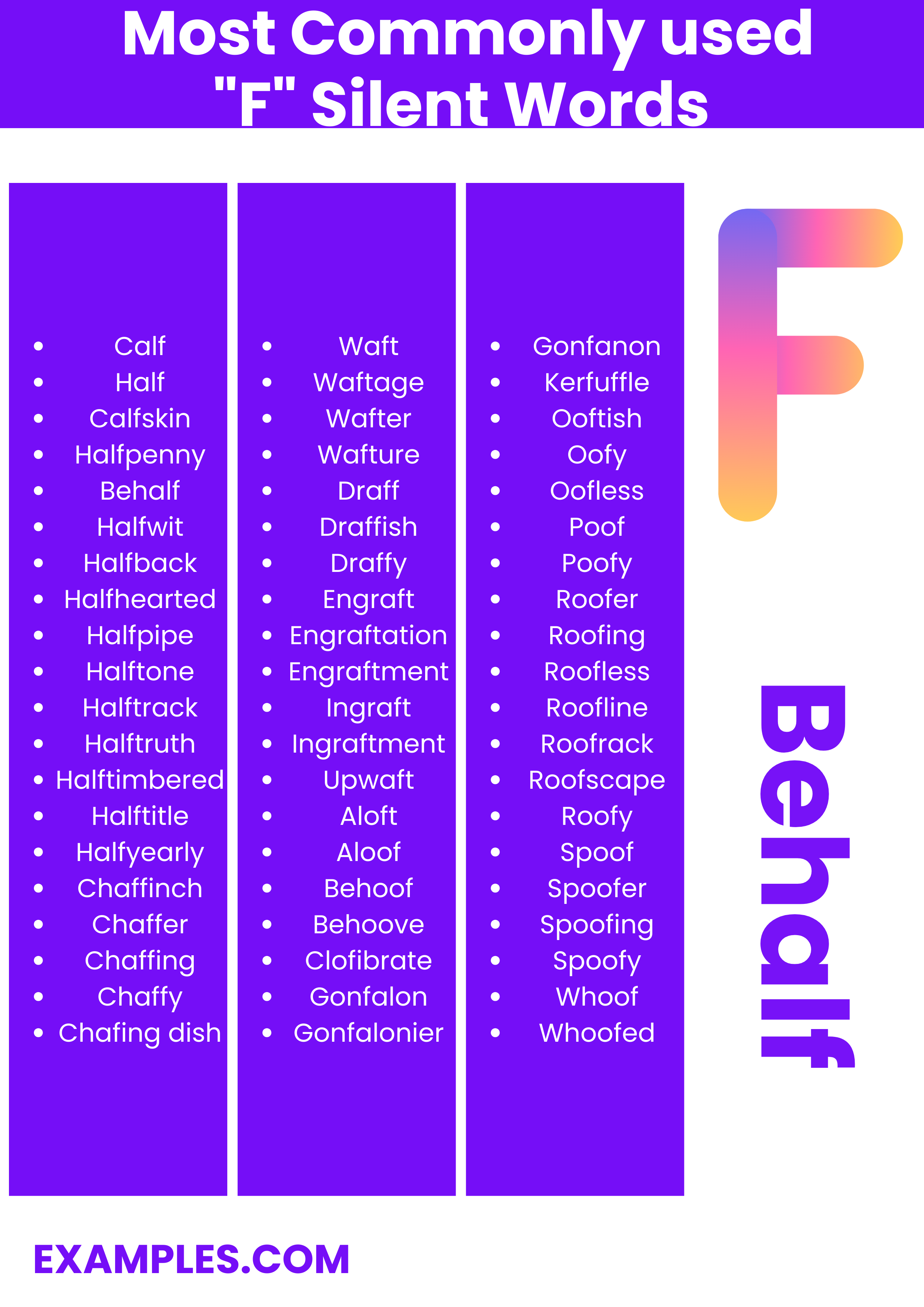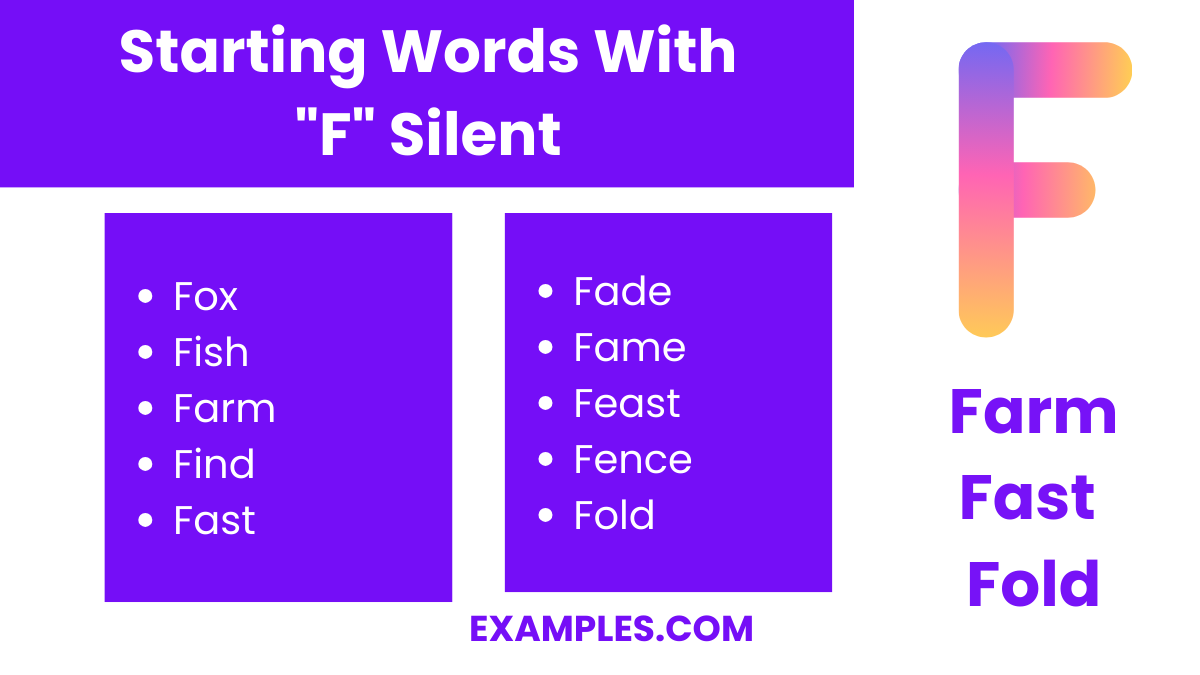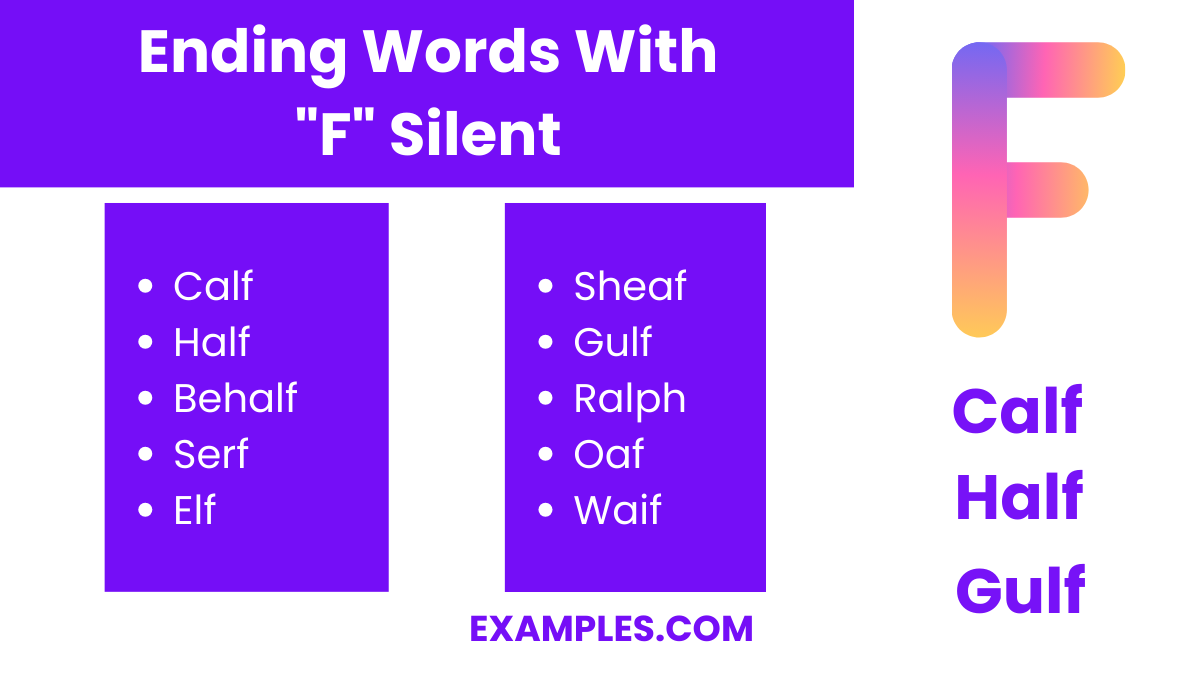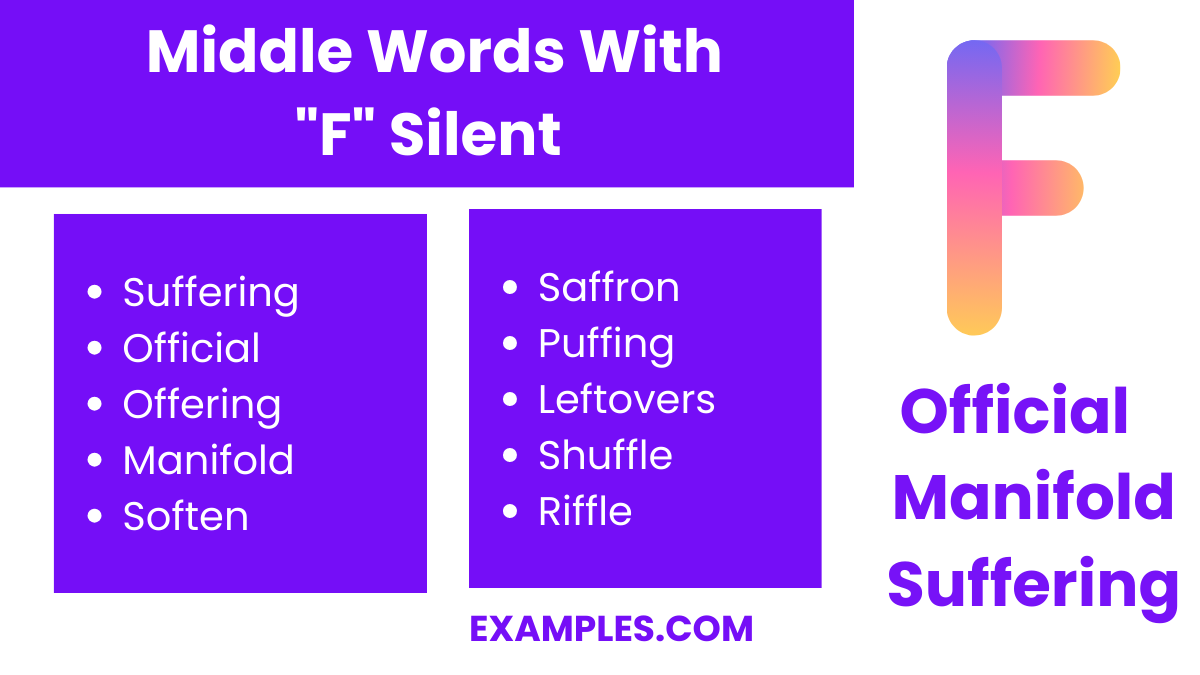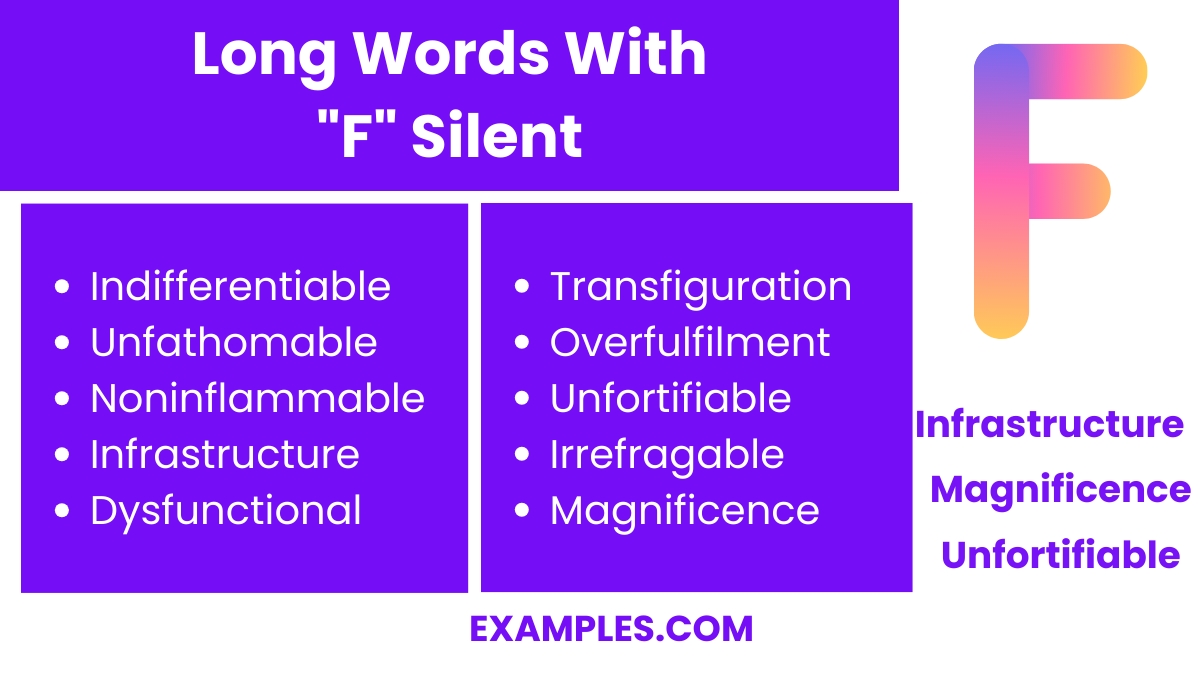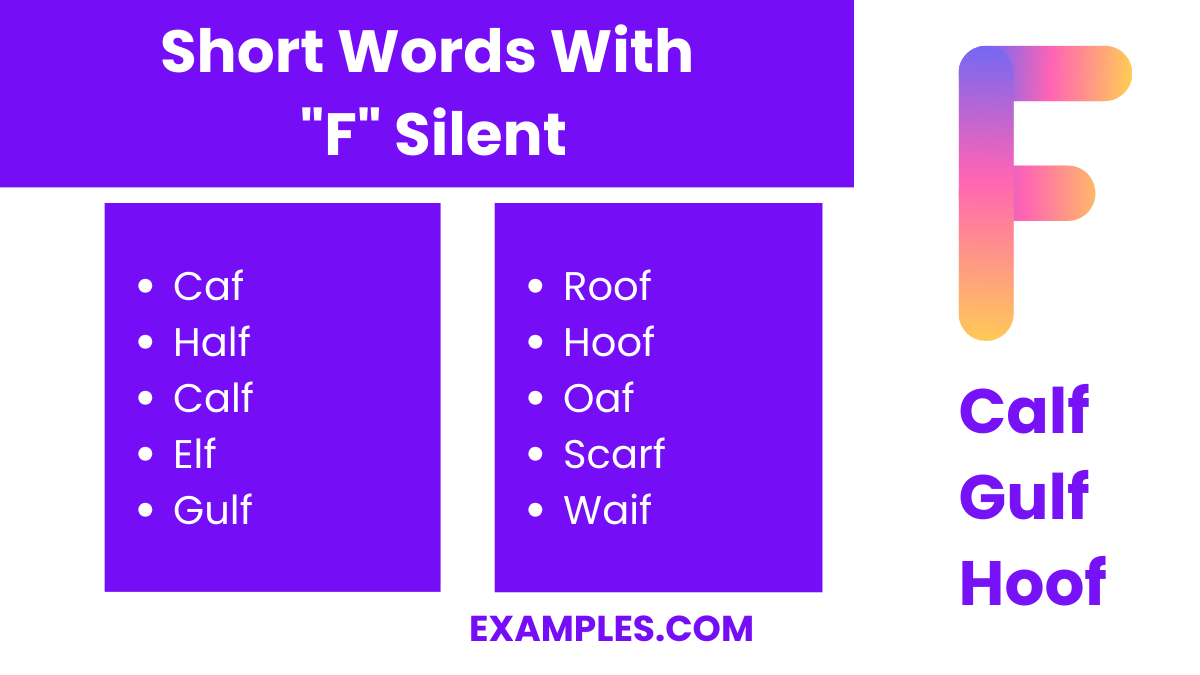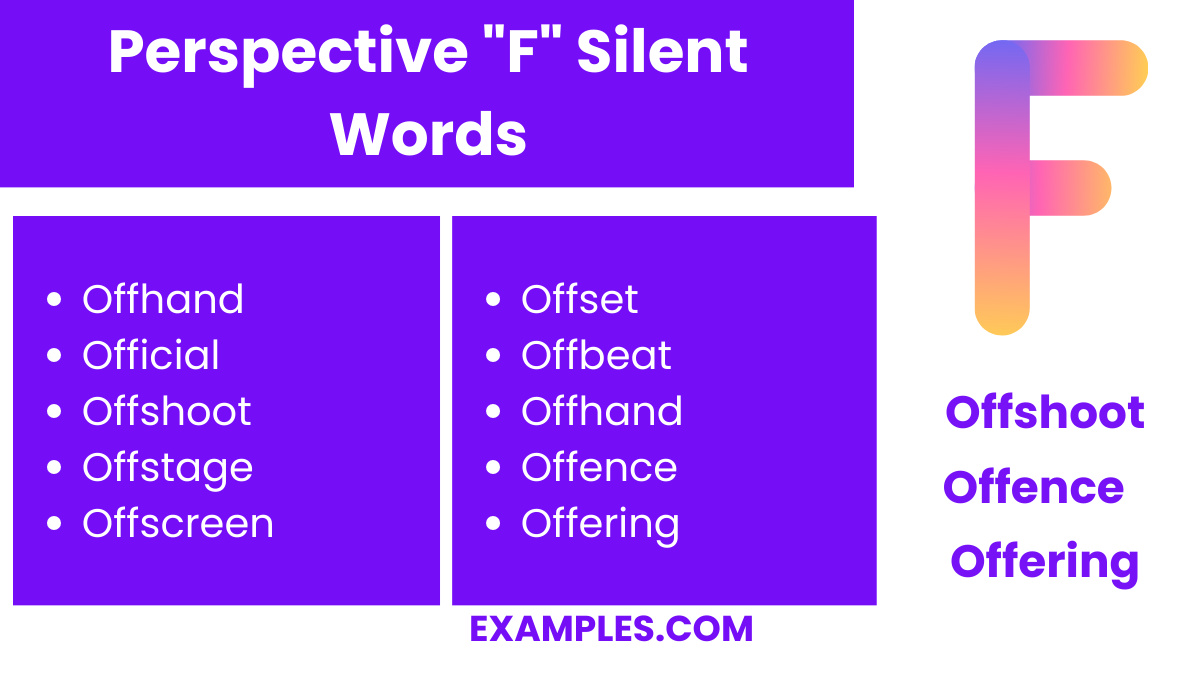450+ F Silent Words List, Meaning, PDF
The silent “F” in the English language is a rare gem, often found in words borrowed from other tongues, adding a layer of complexity and intrigue to the linguistic landscape. These F words, with their unspoken “F”, challenge conventional pronunciation rules, offering a unique learning opportunity. Delving into silent “F” words not only expands one’s vocabulary but also deepens the appreciation for the diverse influences that shape English, making it a fascinating study for linguists and language enthusiasts alike.
Download Most Commonly Used F Silent Words - PDF
50+ Most Commonly used “F” Silent Words
In Daily Use English Words, the phenomenon of silent letters adds a layer of complexity and richness to the language’s pronunciation. Among these, silent ‘F’ is relatively rare, making the words that do feature it particularly interesting. Below is a comprehensive list of words where the ‘F’ remains unvoiced, along with their phonetic transcriptions to guide pronunciation.
| Word | Phonetic |
|---|---|
| calf | [kɑːf] |
| half | [hɑːf] |
| calfskin | [‘kæfskɪn] |
| halfpenny | [‘heɪpni] |
| behalf | [bɪ’hɑːf] |
| calfskin | [‘kæfskɪn] |
| halfwit | [‘hæfwɪt] |
| halfback | [‘hɑːfbæk] |
| halfhearted | [‘hɑːf’hɑːtɪd] |
| halfpipe | [‘hɑːfpaɪp] |
| halftone | [‘hɑːftoʊn] |
| halftrack | [‘hɑːftræk] |
| halftruth | [‘hɑːftruːθ] |
| halftone | [‘hɑːftoʊn] |
| halfheartedly | [‘hɑːf’hɑːtɪdlɪ] |
| halfpence | [‘heɪpəns] |
| halfheartedness | [‘hɑːf’hɑːtɪdnəs] |
| halfsister | [‘hɑːf’sɪstər] |
| halfblood | [‘hɑːfblʌd] |
| halfboard | [‘hɑːfbɔːrd] |
| halfbreed | [‘hɑːf’briːd] |
| halfbaked | [‘hɑːf’beɪkt] |
| halfmast | [‘hɑːf’mɑːst] |
| halfmoon | [‘hɑːf’muːn] |
| halfnote | [‘hɑːf’noʊt] |
| halfpace | [‘hɑːfpeɪs] |
| halfpay | [‘hɑːf’peɪ] |
| halfprice | [‘hɑːf’praɪs] |
| halfstep | [‘hɑːf’stɛp] |
| halftimbered | [‘hɑːf’tɪmbərd] |
| halftitle | [‘hɑːf’taɪtl] |
| halfyearly | [‘hɑːf’jɪərlɪ] |
| chaffinch | [‘tʃæfɪntʃ] |
| chaffer | [‘tʃæfər] |
| chaffing | [‘tʃæfɪŋ] |
| chaffy | [‘tʃæfɪ] |
| chafing dish | [‘tʃeɪfɪŋ dɪʃ] |
| waft | [wɑːft] |
| waftage | [‘wɑːftɪdʒ] |
| wafter | [‘wɑːftər] |
| wafture | [‘wɑːftjʊər] |
| draff | [dræf] |
| draffish | [‘dræfɪʃ] |
| draffy | [‘dræfɪ] |
| engraft | [ɪn’grɑːft] |
| engraftation | [ˌɪnɡrɑːf’teɪʃn] |
| engraftment | [ɪn’grɑːftmənt] |
| ingraft | [ɪn’grɑːft] |
| ingraftment | [ɪn’grɑːftmənt] |
| upwaft | [‘ʌpwɑːft] |
| aloft | [ə’lɒft] |
| aloof | [ə’luːf] |
| behoof | [bɪ’huːf] |
| behoove | [bɪ’huːv] |
| clofibrate | [‘kləʊfaɪbreɪt] |
| clofibrate | [‘kləʊfɪbreɪt] |
| gonfalon | [‘ɡɒnfəlɒn] |
| gonfalonier | [ˌɡɒnfələ’nɪə] |
| gonfanon | [‘ɡɒnfənɒn] |
| kerfuffle | [kə’fʌfl] |
| ooftish | [‘uːftɪʃ] |
| oofy | [‘uːfɪ] |
| oofless | [‘uːflɪs] |
| poof | [puːf] |
| poofy | [‘puːfɪ] |
| roofer | [‘ruːfər] |
| roofing | [‘ruːfɪŋ] |
| roofless | [‘ruːflɪs] |
| roofline | [‘ruːflaɪn] |
| roofrack | [‘ruːfræk] |
| roofscape | [‘ruːfskeɪp] |
| roofy | [‘ruːfɪ] |
| spoof | [spuːf] |
| spoofer | [‘spuːfər] |
| spoofing | [‘spuːfɪŋ] |
| spoofy | [‘spuːfɪ] |
| whoof | [huːf] |
| whoofed | [huːft] |
| whoofing | [‘huːfɪŋ] |
| woof | [wʊf] |
| woofed | [wuːft] |
| woofing | [‘wʊfɪŋ] |
| woofy | [‘wʊfɪ] |
Starting Words With “F” Silent
Finding words in English with a silent “f” at the beginning is exceptionally challenging, as this is not a common phonetic characteristic in English. The letter “f” is almost always pronounced when it appears at the start of words. Unlike other letters such as “k” (as in “knife”) or “g” (as in “gnome”), which can be silent in certain positions, the “f” does not share this trait in standard English spelling and pronunciation, making it a rarity especially when considering rhyming words. This uniqueness in English phonetics underscores the importance of understanding the pronunciation rules that govern the language, enhancing learners’ abilities to master rhyming words and broader linguistic patterns.
However, to address the essence of your request, let’s creatively adapt by highlighting a few words where “f” is prominently featured, albeit not silent, and provide sentences and phonetics for each to assist in teaching pronunciation and usage. This adaptation aims to provide valuable teaching material within the constraints of English phonetics.
- Fox – /fɒks/ (UK), /fɑks/ (US) – “The fox sneaked into the yard at dusk.”
- Fish – /fɪʃ/ – “We saw a colorful fish in the aquarium.”
- Farm – /fɑːm/ (UK), /fɑrm/ (US) – “They have chickens and cows on their farm.”
- Find – /faɪnd/ – “Can you find the missing piece of this puzzle?”
- Fast – /fɑːst/ (UK), /fæst/ (US) – “He runs incredibly fast for his age.”
- Fade – /feɪd/ – “The colors of the fabric will fade over time.”
- Fame – /feɪm/ – “She gained fame as a talented actress.”
- Feast – /fiːst/ – “The village held a feast to celebrate the harvest.”
- Fence – /fɛns/ – “They put up a fence to keep the rabbits out.”
- Fold – /foʊld/ (US), /fəʊld/ (UK) – “Please fold the clothes neatly.”
Ending Words With “F” Silent
The phenomenon of silent “F” at the end of words, though less common, offers a unique insight into the quirks of English spelling and pronunciation, reflecting the language’s rich history and its evolution over time. This characteristic can be observed in both singular & plural words, providing educators with a golden opportunity to delve into historical linguistics with students. Exploring these instances enhances students’ understanding of why English behaves the way it does, serving as an excellent method to develop their spelling and phonetic skills.
- Calf – (/kæf/) The young of domestic cattle and other bovine species.
- Half – (/hæf/) One of two equal or nearly equal parts into which something is or can be divided.
- Behalf – (/bɪˈhæf/) In the interest or support of someone or something.
- Serf – (/sɜːrf/) A laborer who is bound to the land and owned by the feudal lord.
- Elf – (/ɛlf/) A mythical, supernatural being, often depicted as a small, humanlike figure with pointed ears and magical powers.
- Sheaf – (/ʃiːf/) A bundle of grain stalks laid lengthwise and tied together after reaping.
- Gulf – (/ɡʌlf/) A large deep inlet of the sea almost surrounded by land, with a narrow mouth.
- Ralph – (/rælf/) A male given name, sometimes used in literature and film.
- Oaf – (/oʊf/) A person who is clumsy, stupid, or uncultivated.
- Waif – (/weɪf/) A homeless, neglected, or abandoned person, especially a child.
Middle Words With “F” Silent
The silent “F” nestled within words is a unique characteristic in English, often a relic of the language’s extensive borrowing from other tongues, particularly evident in consonant words. These instances serve as an excellent tool for educators to explore the intricacies and evolution of English with their students.By delving into these examples, teachers can provide students with a deeper understanding of English’s diverse phonetic landscape, highlighting the silent interplay among consonants and enriching their linguistic repertoire.
- Suffering – (/ˈsʌfərɪŋ/) The state of undergoing pain, distress, or hardship.
- Official – (/əˈfɪʃəl/) Relating to an authority or public body and its duties, actions, and responsibilities.
- Offering – (/ˈɒfərɪŋ/) A thing offered, especially as a gift or contribution.
- Maniffold – (/ˈmænɪˌfoʊld/) Many and various.
- Soften – (/ˈsɔftən/) Make or become softer.
- Saffron – (/ˈsæfrən/) An orange-yellow flavoring, food coloring, and dye made from the dried stigmas of a crocus.
- Puffing – (/ˈpʌfɪŋ/) Breathing heavily; panting.
- Leftovers – (/ˈlɛftˌoʊvərz/) Food remaining after a meal.
- Shuffle – (/ˈʃʌfəl/) Walk by dragging one’s feet along or without lifting them fully from the ground.
- Riffle – (/ˈrɪfəl/) Turn over something, especially the pages of a book, quickly and casually.
Long Words With “F” Silent
Delving into the realm of long words with a silent “F” presents a unique opportunity to explore the vast and often surprising world of English vocabulary, especially when it comes to describing words that enrich narrative and discourse. These words, characterized by their length and the unexpected silent “F,” offer a rich vein for linguistic exploration and learning. For educators, they provide a platform to discuss the origins and evolution of language, enhancing students’ vocabulary and their understanding of complex phonetic and spelling rules.
- Indifferentiable – (/ˌɪndɪˈfɛrənʃəbl/) Unable to be distinguished from one another.
- Unfathomable – (/ʌnˈfæðəməbl/) Impossible to understand or comprehend.
- Noninflamable – (/ˌnɒnɪnˈflæməbl/) Not easily set on fire; not flammable.
- Infrastructure – (/ˈɪnfrəˌstrʌktʃər/) The basic physical and organizational structures needed for the operation of a society or enterprise.
- Disfunctional – (/dɪsˈfʌŋkʃənəl/) Not operating normally or properly.
- Transfiguration – (/ˌtrænsfɪɡjʊˈreɪʃən/) A complete change of form or appearance into a more beautiful or spiritual state.
- Overfulfilment – (/ˌoʊvərˈfʊlfɪlmənt/) The act of fulfilling a task or requirement to an extent beyond what is required or expected.
- Unfortifiable – (/ʌnˈfɔːrtɪfaɪəbl/) Not capable of being fortified or made stronger.
- Irrefragable – (/ɪˈrɛfrəɡəbl/) Impossible to refute or dispute; indisputable.
- Magnificence – (/mæɡˈnɪfɪsəns/) The quality of being grand or splendid; splendid beauty or grandeur.
Short Words With “F” Silent
Short words with a silent “F” provide a fascinating glimpse into the quirks and idiosyncrasies of English spelling and pronunciation, serving as perfect examples of sight words that challenge conventional phonetic rules. These compact yet intriguing words are ideal for introducing learners to the concept of silent letters, making them aware of the complexities and nuances of English phonetics
- Caf – (/kæf/) A young bovine animal, especially a domestic cow or bull in its first year.
- Half – (/hæf/) One of two equal parts of something.
- Calf – (/kɑːf/) The young of certain other mammals, such as elephants, whales, and seals.
- Elf – (/ɛlf/) A supernatural creature of folk tales, typically represented as a small, elusive figure in human form with pointed ears, magical powers, and a capricious nature.
- Gulf – (/ɡʌlf/) A large deep inlet of the sea almost surrounded by land, with a narrow mouth.
- Roof – (/ruːf/) The structure forming the upper covering of a building or vehicle.
- Hoof – (/huːf/) The horny part of the foot of an ungulate animal, especially a horse.
- Oaf – (/oʊf/) A stupid, uncultivated, or clumsy person.
- Scarf – (/skɑːrf/) A length or square of fabric worn around the neck or head.
- Waif – (/weɪf/) A homeless, neglected, or abandoned person, especially a child.
Perspectives Words With “F” Silent
Exploring perspectives words with a silent “F” unveils a nuanced dimension of English vocabulary, where the silent “F” enriches the linguistic tapestry without asserting its presence in pronunciation. These words, often reflective of viewpoints, attitudes, or approaches, provide an excellent avenue for educators to enhance critical thinking and expressive skills in students. By integrating these encouraging words into discussions, debates, and writings, teachers can foster a deeper understanding of diverse perspectives, encouraging students to articulate their thoughts with clarity and confidence. This approach not only broadens students’ vocabularies but also sharpens their ability to convey nuanced viewpoints, making language a powerful tool for expression and comprehension.
- Offhand – (/ˈɒfˌhænd/) Without previous thought or consideration; spontaneously.
- Official – (/əˈfɪʃəl/) Authorized by a proper authority; formally recognized.
- Offshoot – (/ˈɒfˌʃuːt/) Something that develops from something else; a branch or derivative.
- Offstage – (/ˈɒfˌsteɪdʒ/) In or to the part of the stage not visible to the audience; behind the scenes.
- Offscreen – (/ˈɒfˌskriːn/) Not on or directly related to what is seen on a television or cinema screen.
- Offset – (/ˈɒfˌsɛt/) A counterbalance or compensating element; something that serves to counteract or balance.
- Offbeat – (/ˈɒfˌbiːt/) Unconventional; different from the usual.
- Offhand – (/ˈɒfˌhænd/) Done without preparation or forethought; impromptu.
- Offence – (/əˈfɛns/) A breach of a law or rule; an illegal act.
- Offering – (/ˈɒfərɪŋ/) Something presented or given; a contribution or gift.
In conclusion, words with a silent “F” represent a fascinating linguistic feature, offering a window into the complex history and evolution of the English language. By exploring these words, learners can enhance their pronunciation skills, expand their vocabularies, and gain a deeper appreciation for the intricacies of language, ultimately enriching their communication abilities and linguistic knowledge.



